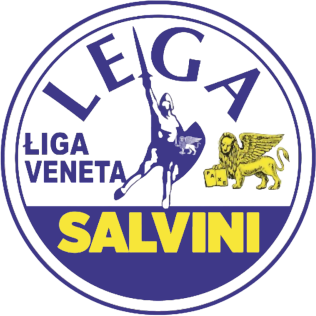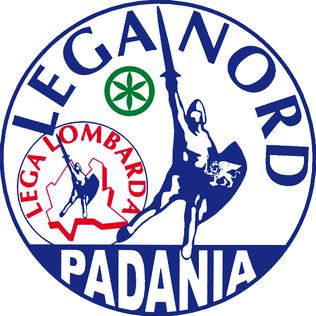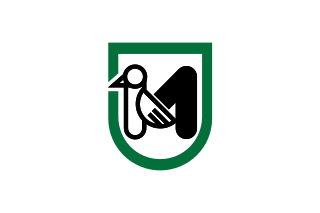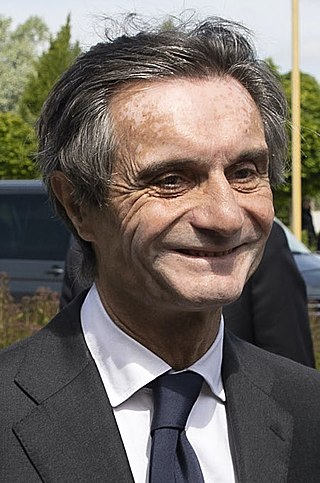
Lega Nord, whose complete name is Lega Nord per l'Indipendenza della Padania, is a right-wing, federalist, populist and conservative political party in Italy. In the run-up of the 2018 general election, the party was rebranded as Lega (transl. League), without changing its official name. The party was nonetheless frequently referred to only as "Lega" even before the rebranding, and informally as the Carroccio. The party's latest elected leader was Matteo Salvini.

Liga Veneta, whose complete name is Liga Veneta per Salvini Premier, is a regionalist political party active in Veneto.

Lega Lombarda, whose complete name is Lega Lombarda per Salvini Premier, is a regionalist political party active in Lombardy. Established in 1984, it was one of the founding "national" sections of Lega Nord (LN) in 1991 and has been the regional section of Lega per Salvini Premier (LSP) in Lombardy since 2020. Along with Liga Veneta, the LL has formed the bulk of the federal party (LN/LSP), which was led by Lombards since its foundation.

The Politics of Lombardy, Italy, takes place in a framework of a semi-presidential representative democracy, whereby the President of the Region is the head of government, and of a pluriform multi-party system. Legislative power is vested in the Regional Council of Lombardy, while executive power is exercised by the Regional Government led by the President, who is directly elected by the people. The current Statute, which regulates the functioning of the regional institutions, has been in force since 2008.

The Politics of Piedmont, Italy takes place in a framework of a presidential representative democracy, whereby the President of Regional Government is the head of government, and of a pluriform multi-party system. Executive power is exercised by the Regional Government. Legislative power is vested in both the government and the Regional Council.

The Politics of Abruzzo takes place in a framework of a presidential representative democracy, whereby the President of Regional Government is the head of government, and of a pluriform multi-party system. Executive power is exercised by the Regional Government. Legislative power is vested in both the government and the Regional Council.

The Politics of Campania takes place in a framework of a presidential representative democracy, whereby the President of Regional Government is the head of government, and of a pluriform multi-party system. Executive power is exercised by the Regional Government. Legislative power is vested in both the government and the Regional Council.

The Politics of Emilia-Romagna, Italy takes place in a framework of a presidential representative democracy, whereby the President of Regional Government is the head of government, and of a pluriform multi-party system. Executive power is exercised by the Regional Government. Legislative power is vested in both the government and the Legislative Assembly.

The Politics of Liguria, Italy takes place in a framework of a presidential representative democracy, whereby the President of Regional Government is the head of government, and of a pluriform multi-party system. Executive power is exercised by the Regional Government. Legislative power is vested in both the government and the Regional Council.

The Politics of Marche, Italy takes place in a framework of a semi-presidential representative democracy, whereby the President of the Region is the head of government, and of a pluriform multi-party system. Legislative power is vested in the Regional Council, while executive power is exercised by the Regional Government led by the President, who is directly elected by the people. The current Statute, which regulates the functioning of the regional institutions, has been in force since 2004.

The Politics of Umbria, one of the 20 regions of Italy, takes place in a framework of a semi-presidential representative democracy, whereby the president of the region is the head of government, and of a pluriform multi-party system. Legislative power is vested in the Legislative Assembly of Umbria, while executive power is exercised by the Regional Cabinet led by the President, who is directly elected by the people. The current statute, which regulates the functioning of regional institutions, has been in force since 2005.

The 2000 Lombard regional election took place on 16 April 2000. The 7th term of the Regional Council was chosen.

The 1995 Lombard regional election took place on 23 April 1995. The 6th term of the Regional Council was chosen.

The Regional Council of Lombardy is the legislative assembly of Lombardy, Italy.

The 2013 Italian general election was held on 24 and 25 February 2013 to determine the 630 members of the Chamber of Deputies and the 315 elective members of the Senate of the Republic for the 17th Italian Parliament. The centre-left alliance Italy Common Good, led by the Democratic Party (PD), obtained a clear majority of seats in the Chamber of Deputies thanks to a majority bonus that effectively trebled the number of seats assigned to the winning force and narrowly defeated the centre-right alliance of former Prime Minister Silvio Berlusconi in the popular vote. Close behind, the new anti-establishment Five Star Movement of comedian Beppe Grillo became the third force, well ahead of the centrist coalition of outgoing Prime Minister Mario Monti. In the Senate, no political group or party won an outright majority, resulting in a hung parliament.

The 2013 Lombard regional election took place on 24 and 25 February 2013 and was the first snap election in Lombard political history, and the first one paired with a general election. The 10th term of the Regional Council was chosen.

Attilio Fontana is an Italian politician from Varese, Lombardy. He has served as President of Lombardy since 2018 leading a centre-right coalition.

Giovanni Fava is an Italian politician of Lega Nord, MP in the Italian Chamber of Deputies from 28 April 2006 to 4 June 2013 and Mayor of Pomponesco for two consecutive full terms from 22 November 1993 to 13 May 2001.

Lega, whose official name is Lega per Salvini Premier, is a right-wing populist political party in Italy, led by Matteo Salvini. The LSP is the informal successor of Lega Nord and, while sharing the latter's heartland in northern Italy, it is active all around the country.

The 2023 Lombard regional election took place on 12 and 13 February 2023. The election took place concurrently with the 2023 Lazio regional election, as decided by the Italian government on 9 December 2022.



























